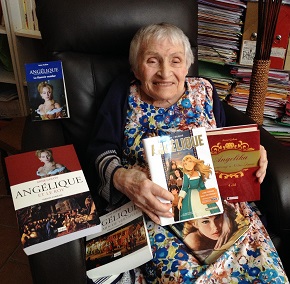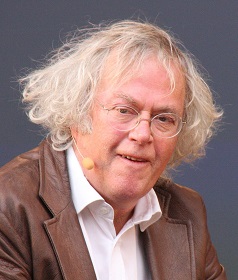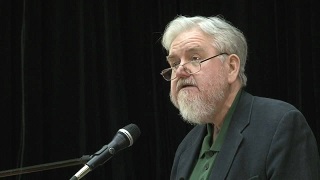In Memoriam Anne Golon
De Franse schrijfster Anne Golon is op afgelopen vrijdag op 95-jarige leeftijd overleden in Versailles. Anne Golon werd geboren als Simone Changeux in Toulon, Frankrijk op 19 december 1921. zij is vooral bekend geworden als schrijfster van de Angélique-cyclus. Zie ook ook alle tags voor Anne Golon op dit blog.
Uit:Angélique et la Cour des Miracles
« Pour un peu, elles seraient allées s’installer tout de suite devant la maison de la rue de la Ferronnerie, mais les autres les houspillèrent et Cul-de-Bois rugit une fois de plus, les injuriant copieusement: — Merde alors! Si nous nous occupons de notre boulot et de nos petites affaires, alors que le Grand Coesre nous attend! Qu’est-ce qui m’a foutu des mémés pareilles! Les usages se perdent, ma parole !… Les mémés confuses baissèrent la tête et tremblotèrent du menton. Puis chacun, qui par un trou, qui par l’autre, se glissa dans le cimetière. Le crieur des morts s’éloigna en secouant sa clochette. Aux carrefours, il s’arrêtait, levant son visage vers la lune, et psalmodiait lugubrement:
Réveillez-vous, gens qui dormez Priez Dieu pour les trépassés…
Angélique, les yeux agrandis, s’avançait à travers le vaste espace gorgé de cadavres. Çà et là il y avait des fosses communes grandes ouvertes, déjà à moitié pleines de corps cousus dans leurs linceuls, et qui attendaient un nouveau contingent de morts pour être refermées. Quelques stèles, quelques dalles, posées à même le sol, marquaient ilasmaier„,tombes de familles plus fortunées. Mais c’était ici depuis des siècles le cimetière des pauvres gens. Les riches se faisaient enterrer à Saint-Paul. La lune, qui avait choisi enfin de régner dans un ciel sans nuages, éclairait maintenant la mince couche de neige recouvrant le toit de l’église et des bâtiments alentour. La croix des Buteaux, qui était un haut crucifix de métal, dressé près du prêchoir, au centre du terrain, luisait doucement. Le froid atténuait l’odeur nauséabonde. Personne d’ailleurs n’y attachait d’importance et Angélique elle-même respirait avec indifférence cet air saturé de miasmes. Ce qui attirait son regard et la sidérait au point qu’elle avait l’impression d’être la proie d’un cauchemar, c’étaient les quatre galeries qui, partant de l’église, formaient l’enclos du cimetière. Ces bâtiments datant du Moyen Âge étaient composés, dans leurs soubassements, d’un cloître aux arcades en ogive où, le jour venu, les marchands établissaient leurs éventaires. Mais, au-dessus du cloître, se trouvaient des galetas couverts de toits de tuiles, et qui reposaient du côté du cimetière sur des piliers de bois, laissant ainsi des intervalles à claire-voie entre les toitures et les voûtes. Tout cet espace était comblé d’ossements. Des milliers et des milliers de têtes de morts et de débris de squelettes s’entassaient là. Les greniers de la mort, gorgés de leur sinistre récolte, exposaient aux regards et à la méditation des vivants des amoncellements inouïs de crânes que les courants d’air séchaient et que le temps réduisait en cendres. Mais, sans cesse, de nouvelles provendes, extraites de la terre du cimetière, les remplaçaient. En effet, un peu partout, près des tombes, on voyait des tas de squelettes assemblés en fagots ou les sinistres boules blanches des têtes de morts soigneusement empilées par le fossoyeur et qui, demain, seraient rangées dans les greniers, au-dessus du cloître. —«

Anne Golon (19 december 1921 – 14 juli 2017)



